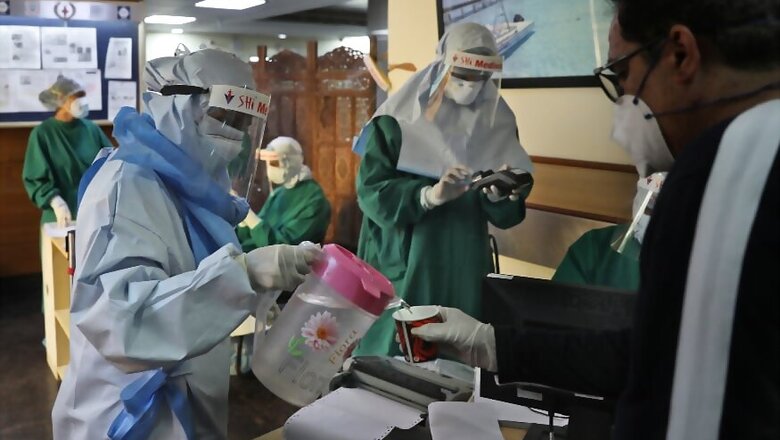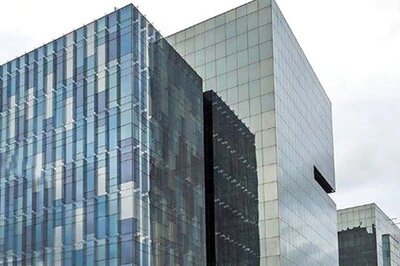
views
As Delhi gears up to re-open weekly markets, restaurants and hotels, the capital has seen a steady surge in the number of Covid-19 cases. However, unlike in June, when strict social distancing measures were in place, it is now in the Unlock mode. Additionally, patients from beyond Delhi’s borders are also steadily streaming in to seek treatment. Of the 14,000 beds, 4,500 are occupied, of which approximately 30%, i.e. 1,500 patients, are not Delhi residents.
In an exclusive interview with CNN-News 18’s Rupashree Nanda, Delhi’s Health Minister Satyendar Jain spoke about a range of issues including, the new challenges facing Delhites and the AAP government in their fight against Covid-19.
Q. Cases are expected to touch 3,000 soon. Will there be a second wave in Delhi?
Satyendar Jain: This is not a question of touching the 3000-mark. We have started testing very aggressively. Yesterday, we had conducted 32,000-33,000 tests. Today, we may go close to 40,000. We are testing very aggressively. And our aim is that not a single person who may be positive goes untraced so that the same person may not spread the disease further. It is possible that in a week, ten days or a bit more, the case count will start falling.
Q. So, your reading is that more cases are being reported because you are testing more?
Satyendar Jain: Aggressive testing is the main reason. There is an element of fatigue. People are not wearing masks, so there is more chance of contracting the disease.
Q. Hasn’t the SDMA recommended increasing the fines in cases where people are found not wearing masks?
Health Min, Satyendar Jain: Fines are already being imposed. Now it is Rs 500. And that will continue.
Q. Apart from testing more aggressively, what other measures is the Delhi government taking to check the spread of coronavirus?
Satyendar Jain: In Delhi, on an average, 16,000- 17,000 tests per day were being conducted. Today, it is 38,000. So it is more than double of what it used to be. So we test the maximum number that’s possible. Mohalla clinics are being used as testing centres as well. This is to increase the number of testing centres. So the facility of testing is available in all 265 dispensaries and in all hospitals.
Q. Last time when Delhi saw a case count of around 2,500-3,500, there was a partial lockdown. Patients from across the borders were also less. But now, the capital city is in Unlock mode and 50% of the ICU beds in private hospitals are occupied by patients from outside…
Satyendar Jain: Substantial number of patients in private hospitals are from outside Delhi. In some hospitals, when we checked, we found that 50%-70% of the patients were from outside Delhi.
Q. What about government hospitals? And is that a cause of concern for the Delhi government, given how cases from within Delhi are also rising?
Satyendar Jain: In all, 30% of patients are from outside Delhi. Yes, this is a concern — how do we increase bed capacity as much as possible. Right now, the situation is under control. But we don’t want a situation where if the occupancy increases, there’s a problem.
Q. What are the specifics of the third sero survey in Delhi?
Satyendar Jain: This sero survey has started on September 1. Over the next one or two days, sample collection will be completed. In the next ten days, results will be out. Samples are being collected district-wise, as well as ward-wise. The sample size is 17,000.
Q. How have the sero surveys impacted Delhi’s Covid-19 strategy?
Satyendar Jain: The impact was that we decided to maximise testing. That decision was taken only after looking at the result of the sero survey.
Q. Delhi is now almost in full unlock mode — bars, restaurants, pubs, hotels will reopen. Metro will re-start. Is the government prepared?
Satyendar Jain: When there was a lockdown, even then cases were rising. The most important point is if you wear masks, you can be protected to a great extent.
Q. You have been a Covid- 19 patient, and a critical case. What would you tell the people?
Satyendar Jain: I would urge people to take precautions and be cautious. Many people are not scared. It is possible that they get corona and recover as well. But this is not the right attitude. It is possible that you may have recovered because your immunity levels are good. But you will be a carrier. In your own house, you will have parents, older people, a kid, or someone who is already ill. You could be a threat to his or her life. It is important to protect oneself as well as protect others.
Q. Did you feel scared while you were undergoing treatment?
Satyendar Jain: No, I was not scared. I did not feel any acute difficulty. Doctors were more scared than I was. However, after returning home, I faced a lot of difficulties pertaining to my health.




















Comments
0 comment